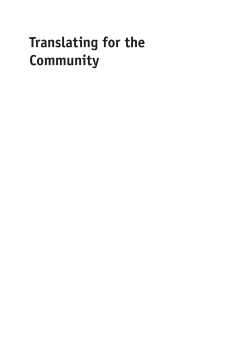
Additional Information
Book Details
Abstract
Written by translation practitioners, teachers and researchers, this edited volume is a much-needed contribution to the under-researched area of community translation. Its chapters outline the specific nature and challenges of community translation (e.g. language policies, language variation within target communities, literacy levels), quality standards, training and the relationship between community translation as a professional practice and volunteer or crowd-sourced translation. A number of chapters also provide insights into the situation of community translation and initiatives taking place in different countries (e.g. Australia, South Africa, Spain, the USA or the UK). The book is of interest to translation practitioners, researchers and trainers, particularly those working or interested in the specific field of community translation, as well as to translation students on undergraduate, postgraduate or further education courses covering translation in general or community translation in particular.
Mustapha Taibi is Associate Professor in Interpreting and Translation at Western Sydney University, Australia. He is the leader of the International Community Translation Research Group and Editor-in-Chief of the journal Translation & Interpreting. Among his recent books is New Insights into Arabic Translation and Interpreting (2016, Multilingual Matters).
Mustapha Taibi and his colleagues have combined incisive scrutiny and powerful evidence to outline the necessity of Public Service Translation to bridge the communication gap between public services and speakers of non-dominant languages in our linguistically diverse communities. This is the kind of work that inspires and energises its readers.
This much-needed edition provides theoretical and practical perspectives on a wide range of topics that have posed challenges to various stakeholders involved in community translation including translators, public authorities, translator educators and researchers. This insightful coverage advances our understanding of the complexities of community translation, which has a critical role in narrowing down socio-cultural, socio-economic as well as socio-educational gaps in multilingual and multicultural societies. Many thanks to the editors and all the other authors for this great contribution!
This book constitutes a timely addition to the literature on community translation. It provides an excellent introduction to the multifaceted role of community translators, which is vital in ensuring social justice for minority and marginalised groups. The contributions included in this book deal with a wide range of under-researched topics, and, therefore, it should become a key reference for future explorations of an activity that has become essential in our linguistically and culturally diverse societies.
This well-structured and innovative book presents a series of informative and highly illuminating studies into community translation. The diversity of relevant issues covered in the collection together with the governing aim of community translation provide a rich repository for community translation researchers.
Luo Tian, Chongqing Jiaotong University, China
Table of Contents
| Section Title | Page | Action | Price |
|---|---|---|---|
| DOI 10.21832/TAIBI9139 | iv | ||
| Contents | v | ||
| Contributors | ix | ||
| Acknowledgements | xiii | ||
| Foreword | xv | ||
| Introduction | 1 | ||
| 1 Quality Assurance in Community Translation | 7 | ||
| 2 Education for Community Translation: Thirteen Key Ideas | 26 | ||
| 3 From the Classroom to the Job Market: Integrating Service-Learning and Community Translation in a Legal Translation Course | 42 | ||
| 4 From Practice to Theory: Societal Factors as a Norm Governing Principle for Community Translation | 69 | ||
| 5 Volunteers and Public Service Translation | 98 | ||
| 6 Community Translation in the UK: An Enquiry into Practice | 110 | ||
| 7 Community Translation in Spanish Penitentiaries: A Coordinated Approach | 121 | ||
| 8 Community Translation in the Australian Context | 138 | ||
| 9 Linguistic Diversity Among Swahili-Speakers: A Challenge for Translation in Australia | 156 | ||
| Concluding Remarks | 174 | ||
| Index | 179 |
